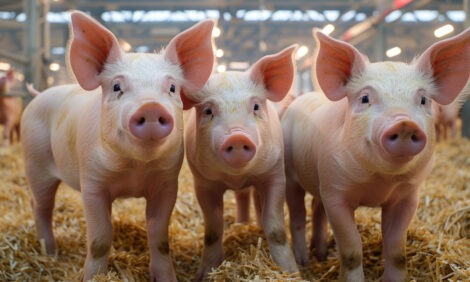



In for the Long Haul
By Katharine Found and published by Ontario Pork. Farmers invest in the care of their animals from farm to truckTransportation can be a stressful experience for livestock, which is why Canada's hog farmers continue to invest in new research to improve animal care from farm to truck.
Travel conditions such as vehicle type, trip length and outside temperature can affect pig comfort and eventually meat quality.
Prairie Swine Centre researcher Dr. Harold Gonyou along with a highly specialized team of researchers from across Canada, including animal behaviourists, agricultural engineers and meat scientists, will review swine transport over the next four years.
He says that while hog deaths due to transport stress are very low, accounting for 0.25 per cent of industry losses, these are often the most costly.
"These pigs are at the end of their production cycle," says Gonyou. "If we lose even one, it's an economical blow to the producer."
The study, which starts in June, will take place in both Western and Eastern Canada and cover the extreme temperatures of all our country's seasons. Gonyou says transportation distances will vary in length and the study will look at a number of different truck designs, including the number of compartments, as well as the quantity and angle of ramps on board.
The researchers will monitor the signs of stress, such as heart rate, body temperature, salivary cortisol (a hormone involved in the body's stress response) and how quickly the animals lie down once loaded on the trucks.
Gonyou says stressful encounters can be fatal, so finding a way to reduce these stressors will in turn reduce the losses.
"Stressful animals are restless animals so it's important for us to look at all of these responses so we can accurately assess which conditions are truly harmful to the pigs," he says.
The project will also be looking at current on-farm conditions to see if changes can be made in handling procedures before and during loading.
In addition to these welfare concerns, Gonyou raises the issue that stress can have negative effects on meat quality leading to a pork that is pale in colour. He says this meat is not only less appetizing to consumers but is rejected by some export markets that the Canadian hog industry heavily relies on - another potential economical blow to the industry.
"The benefits of this study will be seen everywhere," says Gonyou. "We hope to keep our pigs healthy and the meat that is produced will be of optimum quality."
The study, which is expected to conclude by 2011, is being funded by Ontario Pork, Alberta Pork, Sask Pork, the Manitoba Pork Council, Maple Leaf Consumer Foods the Fresh Meats division, the Natural Sciences and Engineering Research Council and Agriculture and Agri-Food Canada.
Also involved with the study are Profs. Cate Dewey and Tina Widowski, and graduate student Emily Toth of the University of Guelph; Dr. Renée Bergeron of the University of Guelph, Alfred Campus; Dr. Trever Crowe of the University of Saskatchewan; Prof. Nora Lewis of the University of Manitoba; Dr. Luigi Faucitano and Stephanie Torrie of Agriculture and Agri-Food Canada; and Jorge Correa of Laval University.
Katharine Found is a writer with SPARK, the University of Guelph's student writing program.
June 2007








